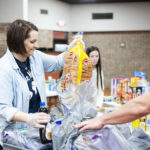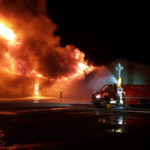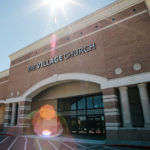ARLINGTON—Fielder Church in Arlington isn’t heaven, but Erin Benton believes the resemblance is greater now than when she and her family joined the congregation 15 years ago.
At that time, the church was about 97 percent Anglo. Gary Smith, then pastor of Fielder Church, recognized the demographics of Arlington had changed, and the congregation no longer reflected its community. He began efforts to make the church staff more racially and ethnically diverse and to lead the congregation toward intentional diversity.
Not long before Erin Benton and her husband Luke arrived at Fielder Church, Jason Paredes joined the church staff as pastor of a mission to reach the city’s growing Spanish-speaking population.
Time of transition
Then in early 2014, Fielder Church overwhelmingly approved a transition plan leading up to their longtime pastor’s retirement in two-and-a-half years and called Paredes as senior pastor-elect.
Paredes and Smith shared preaching responsibilities. Paredes also shared with Smith plans he wanted to see the church implement, such as becoming a multisite congregation and offering bilingual services.
That’s when Smith offered Paredes an object lesson in what Leith Anderson, an evangelical pastor in Minnesota, memorably referred to as “parish poker.” Just as a poker player needs chips to enter a game, a minister begins a new pastorate with a stake roughly equivalent to the percentage of the congregation that voted to call him. As the pastor spends time with the church—visiting the sick, preaching funerals, walking with members through difficult times—he continues to earn chips.
“Gary said, ‘Let me play my chips,’” Paredes recalled. “What I wanted to do would demand a lot of resources and raise a lot of questions. He knew it would be easier for the one who had been lead pastor of 25 years than for the new pastor. So, he removed what probably would have been a roadblock for me. By the time I took the reins, the changes had been made.”
The church committed itself to making disciples and living out the gospel through generosity, sacrificial service, missional living, church planting and providing access to the gospel through multiple sites.
Currently, Fielder Church meets at three sites—in South Central Arlington, in western Grand Prairie and at South Oaks, on U.S. Highway 287 south of Interstate 20. Within the next six years, the church hopes to expand to six campuses.
Sign up for our weekly edition and get all our headlines in your inbox on Thursdays
Diversity by design
Fielder Church also determined it would celebrate differences and seek to become—by 2026—a congregation where no ethnic or cultural group represents more than 50 percent of the multigenerational church family.

“We’re not where we need to be, but we’re way ahead of where we were,” Paredes said.
Currently, the congregation is about two-thirds Anglo, 18 percent Hispanic and 10 percent African American, with the remainder including representatives from several Asian ethnic groups, he reported.
The non-Anglo proportion of the congregation continues to increase 1 percent to 3 percent each year, and the church tracks its progress toward increased diversity in an annual survey.
“It’s a tender balance,” Paredes acknowledged. “If we’re not careful, we can unintentionally send a message that we don’t value our white members, and that’s not the case. We don’t want to lose anybody.”
More than one-third of the staff at Fielder Church is non-Anglo, and worship planners make certain those who lead in worship each Sunday represent the congregation’s commitment to diversity.

“The people on the platform reflect the congregation and the city,” Paredes said. “We consider it a failure if it appears monocultural when you look up on the stage.”
Music is selected that similarly reflects the cultural diversity, as well as generational preferences, and the music ministry staff writes or adapts songs to “weave together the cultures,” he said.
Fielder Church’s commitment to diversity not only shapes worship, but also affects how the congregation handles differences of opinion, Paredes noted.
“Our society is incredibly polarized. We prayed for diversity, and God answered that prayer. So, we will have polarized opinions,” he said.
Dealing with sensitive issues
Diversity in the congregation influences how the pastor approaches sensitive topics in his sermons. When George Floyd died in Minneapolis, Minn., on May 25 after a white police officer knelt on his neck for 8 minutes and 46 seconds, it sparked protests against racial injustice throughout the United States—including Tarrant County.
“If we are committed to being radically diverse, silence would have been deafening in that moment. I said, ‘We’ve got to talk about this,’” Paredes said. “We needed to deal with it head on.”
He challenged members of his congregation to recognize and repent of their prejudices and to find ways to take positive action. He announced a series of conversations his congregation plans to enter with a historically African American church.
Paredes also told his congregation he and his family would participate in a peaceful march for racial justice organized by a Black church and endorsed by city leaders.
“I was able to say to the church, ‘Our mayor has asked us to be part of it,’” he said. “I didn’t know how they would react. I didn’t know what to expect, but they came out by the hundreds. It was all ages and ethnicities. I was moved and shaken—in a good way.”
Cooperation and community service

Fielder Church has developed a reputation for community involvement and cooperating with other congregations in the city, such as a back-to-school backpack drive for the Arlington Independent School District.
Working with the Dallas Cowboys, the annual event has grown to involve 35 churches throughout the community. Last year, the congregations provided more than 40,000 backpacks filled with school supplies for Arlington students.
Fielder Church also has invited other congregations to join periodic Serve the City events.
“That’s when we take off a Sunday from gathering for worship to go into the community to serve,” Paredes explained.
By expanding the Serve the City events from Sunday to include the entire weekend, Fielder Church has been able to involve 15 other churches of various ethnicities in the initiative.
As Fielder Church continues its pilgrimage toward increased diversity, congregational leaders make plans but remain ready to adjust along the way as new opportunities arise.
“The truth is we fast and pray,” Paredes said. “Every step we’ve taken has been after God has opened doors, and we have stepped through them. We know God’s glory is manifested when the dividing wall of hostility is torn down by the gospel.”
‘We’re on a journey. We haven’t arrived yet.”
That vision has captivated Erin Benton, who grew up attending culturally diverse congregations overseas when her parents served as missionaries in Hong Kong.
“It’s been a wonderful gift to our family,” she said.
She is grateful her four children—ages 16, 14, 11 and 6—have the opportunity to develop friendships and enjoy fellowship with peers from different backgrounds and cultures. She hopes those opportunities continue to increase at Fielder Church.
“We’re on a journey. We haven’t arrived yet,” she said. “We know from Revelation that heaven will include every nation, tribe, people and language, all gathered around the throne and worshipping. Our hope and prayer is that our children begin to see that, and it becomes the norm.”
Read more articles like this in CommonCall magazine. CommonCall explores issues important to Christians and features inspiring stories about disciples of Jesus living out their faith. An annual subscription is only $24. To subscribe to CommonCall, click here.














We seek to connect God’s story and God’s people around the world. To learn more about God’s story, click here.
Send comments and feedback to Eric Black, our editor. For comments to be published, please specify “letter to the editor.” Maximum length for publication is 300 words.